Just like he promised, Volodymyr Zelenskiy didn’t reveal any nominations for top posts in his administration up until his inauguration on May 20. Then, in the following days, he announced a number of appointments.
So far the president has appointed the chief of staff, his deputies, aides to the president, as well as the presidential representatives in parliament and the Cabinet of Ministers:
JOIN US ON TELEGRAM
Follow our coverage of the war on the @Kyivpost_official.
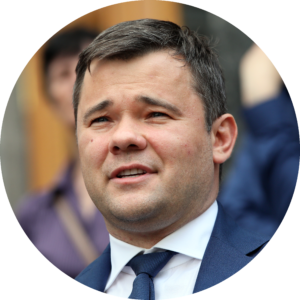 Andriy Bohdan,
Andriy Bohdan,
chief of staff
- View the latest war in ukraine update in the Kyiv Post’s news stories released today.
- Check out the freshest Ukraine news items as of today.
Bohdan, 42, a lawyer for high-profile clients like the notorious oligarch Ihor Kolomoisky, is a friend of Zelenskiy. He played a major role in Zelenskiy’s campaign and was appointed the head of the presidential administration on May 21. The decision drew criticism, both due to Bohdan’s connections to Kolomoisky and the apparent illegality of the appointment. Under the lustration law of 2014, Bohdan is banned from occupying public office — and that includes chief of staff.
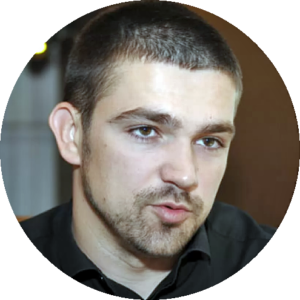 Serhiy Trofimov,
Serhiy Trofimov,
first deputy chief of staff
Trofimov, has been a part of Zelenskiy’s Kvartal 95 production studio since 2005, serving as the executive director of the studio prior to assuming the role of first deputy head of the presidential administration on May 21.
In his new role, Trofimov will assist Bohdan in overseeing the work of the administration, appointing junior staff members, supervising the work of presidential representatives in key government institutions, and helping to implement presidential decrees.
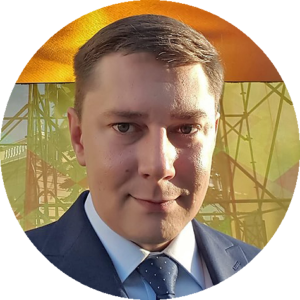 Yuriy Kostyuk,
Yuriy Kostyuk,
deputy chief of staff
On May 21, Kostyuk was named one of the three deputy heads of the presidential administration. Kostyuk worked as a screenwriter for Zelenskiy’s Kvartal 95 production studio under Trofimov. Kostyuk’s exact role in the new administration has yet to be determined, as the scope of responsibilities for deputy heads will be set by Bohdan.
Deputy heads usually oversee the work of multiple departments of the administration, including the departments of economic and social policy, foreign and internal affairs, and human resources. They also manage day-to-day operations.
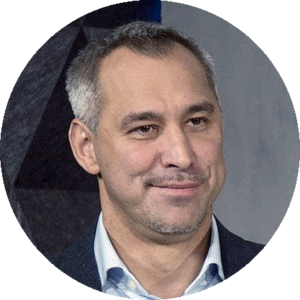 Ruslan Ryaboshabka,
Ruslan Ryaboshabka,
deputy chief of staff
Out of all the deputies, Ryaboshabka, 42, has the most experience working in government institutions.
Ryaboshapka worked in the Ministry of Justice between 1998 and 2010, heading departments that mainly focused on judicial reform and anti-corruption policies. During this time he led Ukraine’s delegation to the Council of Europe’s anti-corruption monitoring body, called GRECO.
During the rule of President Viktor Yanukovych, Ryaboshapka headed the Cabinet of Minister’s anti-corruption bureau and later served as deputy head of the judicial department of the government’s secretariat.
After briefly working for Transparency International Ukraine, a non-governmental anti-corruption watchdog, Ryaboshapka returned to government work, taking a job at the newly created National Agency for Prevention of Corruption. After a conflict with NAPC’s head, Ryaboshapka resigned, criticizing the agency as failing and calling for it to be relaunched.
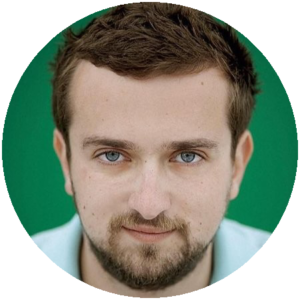 Kyrylo Tymoshenko,
Kyrylo Tymoshenko,
deputy chief of staff
Tymoshenko was appointed deputy chief of staff together with Kostyuk and Ryaboshapka.
Tymoshenko is the founder of the Good Media production studio, which filmed Zelenskiy’s presidential campaign videos, including the most famous one in which Zelenskiy challenged then-President Petro Poroshenko to a debate at Kyiv’s Olimpiyskiy Stadium. Good Media also produced promotional videos for other politicians, including a pseudo-documentary film about Petro Poroshenko’s close ally, lawmaker Ihor Kononenko.
Tymoshenko’s focus in the new administration is yet to be announced.
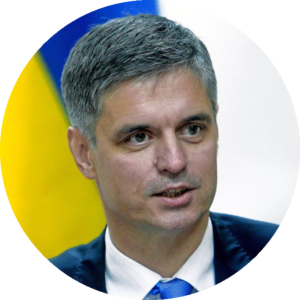 Vadym Prystaiko,
Vadym Prystaiko,
deputy chief of staff
Prystaiko, 49, was appointed as a deputy chief of staff on May 22, after Olena Zerkal — who was appointed with Kostyuk, Ryaboshapka and Tymoshenko — declined the job. Zerkal said she wanted to remain in the Foreign Ministry, where she has been a deputy minister focusing on European integration since 2014. Zerkal wrote on Facebook that she was planning to continue her work in the ministry. She has accompanied Zelenskiy during his meetings with foreign delegations.
Prystaiko, like Zerkal, is a diplomat, serving the country in this role since 1994. He worked as a deputy foreign minister from 2014 until 2017, when he became Ukraine’s representative to NATO. Prior to that, Prystaiko served as the Ukrainian ambassador to Canada from 2012 to 2014.
The most likely outcome is that Prystaiko will focus on foreign affairs during his tenure as deputy head of the presidential administration.
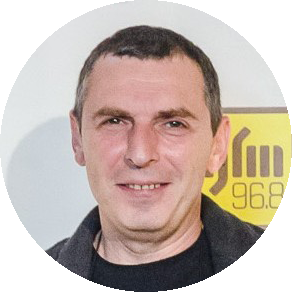 Serhiy Shefir,
Serhiy Shefir,
first presidential aide
Shefir, 54, was appointed as Zelenskiy’s first aide on May 21. Among the primary tasks of the first aide will be assisting the president in day-to-day activities, helping organize meetings and assisting the president in other administrative work.
In a recent interview with The Babel, a news website co-owned by Kolomoisky, Shefir said that his primary task would be to keep
Zelenskiy “humane” when he becomes a politician. In the same interview, he did not provide information on his future role in the presidential administration. Journalists previously considered Shefir to be one of the leading candidates to become the head of the administration.
Shefir has been a long-time business partner and friend of Zelenskiy. Their relationship started in the mid-90s when Shefir and his brother approached Zelenskiy and formed a sketch comedy team to compete in a Russia-based TV show called KVN. The three have been business partners ever since, with the Shefir brothers co-founding Kvartal 95 alongside Zelenskiy.
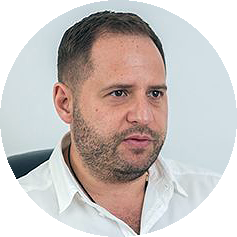 Andriy Yermak,
Andriy Yermak,
presidential aide
Before Yermak was appointed an aide to the president on May 22, he worked as a lawyer specializing in copyrights for the past 20 years. He represented multiple media companies, including the Inter television channel, and worked with Zelenskiy’s Kvartal 95.
Yermak founded Garnet International Media Group, which produces Ukrainian movies and TV shows.
He served as an aide to wrestler and lawmaker Elbrus Tedeyev between 2006 and 2014. Tedeyev won an Olympic gold medal in 2004 and later became a lawmaker from the Party of Regions, led by ousted President Viktor Yanukovych.
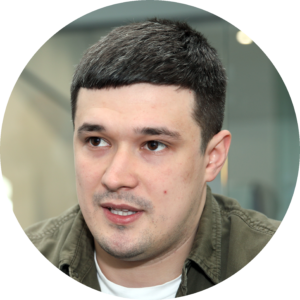 Mykhailo Fedorov,
Mykhailo Fedorov,
advisor-at-large to the president
Before assuming the role of presidential advisor-at-large on May 22, Fedorov was chief digital strategist during Zelenskiy’s presidential campaign. Fedorov oversaw social networks – Instagram, Facebook, Telegram and YouTube. Fedorov had a digital agency prior to joining Zelenskiy’s team.
As an advisor, Fedorov will be working on e-government, digitalizing ID cards, medicine, tax and business and simplifying all bureaucratic procedures.
“We want to ensure that all procedures can be performed through phone apps. Direct democracy is when all decisions are made with the help of a single button on the smartphone,” Fedorov said when he was presented as a member of Zelenskiy’s team on April 18.
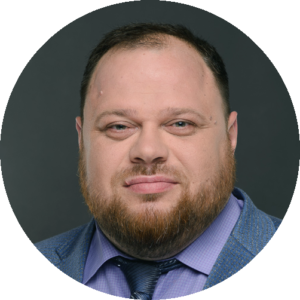 Ruslan Stefanchuk,
Ruslan Stefanchuk,
presidential representative in parliament
Stefanchuk, 43, was appointed as the president’s representative in parliament on May 21. Among his tasks is promoting the president’s agenda in parliament by presenting the president’s draft laws. The representative may also express the president’s position on draft laws undergoing a vote in parliament.
Stefanchuk is a doctor of law and has been relatively unknown, working as a professor in the Khmelnitsky University of Management and Law. In a comment to the Hromadske news website, Stefanchuk said that he met Zelenskiy a long time ago when they both participated in the comedy competition known as KVN, presumably in the 1990s.
On Zelenskiy’s campaign, Stefanchuk was the “campaign ideologist” and had been drafting the laws the team was preparing for parliament. One of them was a bill to change the electoral system, which failed in the parliament on May 22. Stefanchuk is also working on a bill to introduce a procedure for presidential impeachment.
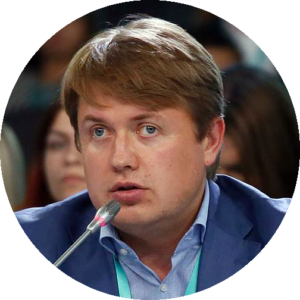 Andriy Gerus,
Andriy Gerus,
presidential representative in the Cabinet of Ministers
Gerus, 37, was appointed as the president’s representative in the Cabinet of Ministers on May 22. Gerus told the Kyiv Post that his role will be ensuring communication between the president and the government.
Gerus is an energy expert and an outspoken critic of Rotterdam+, a notorious scheme that sets high tariffs for utilities due to allegedly high coal prices. The heating and electricity supply companies owned by oligarch Rinat Akhmetov benefit from it.
Prior to becoming presidential representative, Gerus briefly served as a member of the National Commission for State Regulation of Energy and Public Utilities from 2014 to 2015. He also worked at Concorde Capital, a Ukrainian investment firm, both prior to and after his tenure in the energy commission.
He also serves as the head of the Association of Energy Consumers, which unites companies that heavily depend on the prices of electricity. He must now quit this job.
Gerus told the Kyiv Post that he will continue to promote his energy agenda, including postponing the energy market reform.
That reform would liberalize the market and allow consumers to choose from whom to buy electricity. However, it is often criticized as poorly planned and could potentially cause household energy prices to increase substantially. Gerus wants to delay the reform by a year.
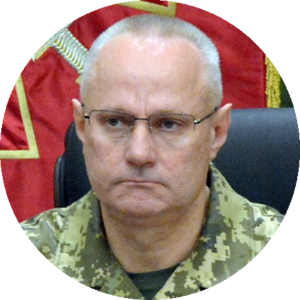 Ruslan Khomchak,
Ruslan Khomchak,
chief of general staff of the Armed Forces
Lieutenant General Khomchak, 51, was appointed as the new chief of general staff of the Armed Forces on May 21.
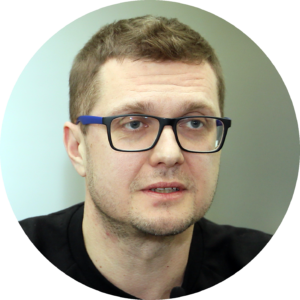 Ivan Bakanov,
Ivan Bakanov,
first deputy head of Ukraine’s Security Service
Bakanov, 45, was appointed as the first deputy head of Ukraine’s Security Service (SBU) on May 21, where he is now in charge of anti-corruption. Bakanov is a childhood friend of Zelenskiy.
Bakanov had been the head of Zelenskiy’s presidential campaign and the newly created Sluga Narodu (Servant of the People) political party, named after the television show in which Zelenskiy portrays a school teacher who is elected president.
Prior to his political activity, Bakanov was the head lawyer of Kvartal 95. According to Schemes, an investigative journalism unit of Radio Free Europe/Radio Liberty, Bakanov traveled with Zelenskiy to Tel-Aviv shortly before the campaign started, where the
two allegedly met with oligarch Kolomoisky, a business partner of Zelenskiy.
Bakanov has never been in public service and has no known experience related to security.
Allies without appointments
There is a handful of people who participated in Volodymyr Zelenskiy’s campaign and weren’t appointed to any posts yet.
Oleksandr Danylyuk 43, was one of the two main speakers for Zelenskiy’s team during the presidential election campaign, mainly focusing on economic issues.
Danylyuk has worked in government since 2005. He served as an economic adviser to Prime Minister Yuriy Yekhanurov under the presidency of Viktor Yushchenko. Danylyuk served as an advisor-at-large to ex-President Viktor Yanukovych on economic matters.
Under President Petro Poroshenko, Danylyuk initially served as the president’s representative in the Cabinet of Ministers, later taking the role of deputy head of the presidential administration. In 2016, he became finance minister in Prime Minister Volodymyr Groysman’s cabinet. He was dismissed by parliament in 2018 after a conflict over the appointment of his deputy, which, according to Danylyuk, was done by Groysman to stall State Fiscal Service reform.
Groysman responded by stating that Danylyuk had overstepped his boundaries and acted inappropriately.
Danylyuk is expected to be appointed Secretary of the National Security and Defense Council in the near future. According to Danylyuk, the council must find a way to keep Ukraine as a gas transit country, while also resolving financial and military difficulties.
Ivan Aparshyn, 62, was presented on April 18 as Zelenskiy’s chief military expert and was seen by many as a potential defense minister.
Aparshyn is a professional army officer, serving most of his life in the army in various positions. He has a longstanding relationship with Anatoliy Grytsenko, former defense minister and leader of the Civic Platform party, under whom Aparshyn worked in the defense ministry. During the 2014 parliamentary campaign, Aparshyn was on Grytsenko’s party list, yet the party failed to get into parliament.
Aivaras Abromavicius, 43, is a former minister of economy and trade and a Ukrainian-Lithuanian investment banker. He met Zelenskiy in early 2019 and became an economic adviser to his campaign. He said he wasn’t interested in working in the presidential administration or running for parliament, leaving only the cabinet.
Sergii Leshchenko, 38, is a lawmaker who recently left the Petro Poroshenko Bloc. He didn’t have an official role in Zelenskiy’s campaign, but was present at several meetings and served as an unofficial advisor to Zelenskiy.
Dmytro Razumkov, 35, the main political consultant and an outspoken member of Zelenskiy’s presidential campaign, wasn’t appointed to a position in the administration. Ryaboshapka announced on May 23 that Razumkov will lead Zelenskiy’s party, Servant of the People, in the July 21 snap parliamentary elections.
Razumkov was a member of the ex-President Viktor Yanukovych’s Party of Regions in 2006-2010. In 2010, he worked for the presidential campaign of Serhiy Tigipko, who came third in the election. He kept working with Tigipko when the latter became deputy prime minister for under Yanukovych and then a lawmaker with the Party of Regions.
You can also highlight the text and press Ctrl + Enter





